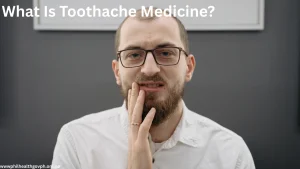Toothache Medicine for Fast Relief and Safe Use
Toothache is one of the most uncomfortable pains people experience. It can disturb sleep, affect eating, and lower focus in daily life. The pain may come suddenly or build slowly over time. While dentists can treat the root cause, toothache medicine is often the first step for quick relief.
In this detailed guide, we will cover everything about toothache medicine: types, uses, safety, natural alternatives, and when to see a dentist.
You May Like: trazodone overdose symptoms
What Is Toothache Medicine?

Toothache medicine refers to drugs or topical treatments that reduce dental pain. These medicines ease symptoms such as throbbing pain, swelling, or fever. They are available in many forms: tablets, syrups, gels, or drops.
Although they relieve discomfort, they do not cure the underlying cause of tooth pain. That’s why dentists recommend using them as temporary solutions until professional care is available.
Why People Need Toothache Medicine
Tooth pain can occur at any age. It may be caused by cavities, infections, gum diseases, injuries, or sensitivity. Without relief, the pain may interfere with eating, sleeping, and speaking.
Toothache medicine helps by:
-
Reducing inflammation around nerves.
-
Lowering fever caused by infection.
-
Numbing the affected area temporarily.
-
Allowing patients to function until they see a dentist.
Common Causes of Toothache Requiring Medicine
Understanding the cause of toothache helps in selecting the right medicine.
-
Cavities: Holes in teeth expose nerves, leading to pain.
-
Gum Disease: Swollen gums can press on teeth.
-
Dental Abscess: Infection near roots creates severe, throbbing pain.
-
Tooth Fractures: Cracked teeth cause sharp pain while chewing.
-
Erosion and Sensitivity: Thin enamel exposes dentin to hot or cold foods.
In all cases, medicine offers short-term relief but dental treatment remains necessary.
Types of Toothache Medicine
1. Over-the-Counter Painkillers
These are the most common and widely available.
-
Ibuprofen (Advil, Nurofen): Reduces inflammation and pain.
-
Acetaminophen (Paracetamol, Tylenol): Relieves pain and fever.
-
Aspirin: Effective but not suitable for children.
-
Naproxen: Long-acting option for stronger pain.
They are usually the first choice for mild to moderate toothaches.
2. Topical Toothache Medicine
Applied directly to gums or teeth, these provide quick but short-term relief.
-
Benzocaine Gels (Orajel, Anbesol): Numb the painful area.
-
Lidocaine Solutions: Stronger numbing effect, often prescribed.
-
Clove Oil (Eugenol): Natural and widely used for its numbing power.
These work well for localized pain, especially when chewing or biting causes discomfort.
3. Prescription Toothache Medicine
When pain is severe, dentists may recommend stronger options.
-
High-dose NSAIDs: Stronger ibuprofen or naproxen.
-
Opioid Combinations: Reserved for extreme pain and short use.
-
Antibiotics (Amoxicillin, Clindamycin): Treat infections, not just pain.
These medicines should only be taken under medical supervision.
Toothache Medicine for Children
Children often suffer from toothache due to cavities, injuries, or teething. Safe options include:
-
Acetaminophen Syrup: Gentle on stomach.
-
Ibuprofen Syrup: Helps with swelling.
-
Topical Teething Gels: Only under a doctor’s advice.
Parents should never give aspirin to children, as it may cause serious conditions like Reye’s syndrome.
Natural Toothache Medicine Alternatives
Many people prefer natural methods when prescription drugs are not available.
-
Clove Oil: Acts as a natural anesthetic.
-
Saltwater Rinse: Reduces bacteria and swelling.
-
Garlic Paste: Contains antibacterial allicin.
-
Peppermint Tea Bags: Mild numbing effect.
-
Cold Compress: Numbs nerves and reduces swelling.
These remedies provide comfort but should not replace dental care.
Safety of Toothache Medicine
Every medicine has risks if not used correctly.
-
NSAIDs (Ibuprofen, Naproxen): May cause stomach irritation if overused.
-
Acetaminophen: Safe in normal doses but harmful to the liver in excess.
-
Benzocaine Gels: Rarely cause blood oxygen issues in children.
-
Antibiotics: Should only be used when infection is present.
Always follow proper dosage and consult a dentist if unsure.
Comparing Toothache Medicine Options
Here’s a simple comparison of available options:
| Medicine Type | Examples | Works Best For | Duration of Relief |
|---|---|---|---|
| OTC Painkillers | Ibuprofen, Acetaminophen | Mild to moderate pain | 4–8 hours |
| Topical Gels | Benzocaine, Clove Oil | Localized pain | 30–60 minutes |
| Prescription | Strong NSAIDs, Antibiotics | Severe infection, swelling | Varies |
| Natural Remedies | Saltwater, Garlic, Cold Compress | Mild pain, temporary relief | Short-term |
Toothache Medicine vs. Dental Treatment
Medicine offers symptom control, but not a cure.
-
Medicine: Relieves pain, lowers swelling.
-
Dental Care: Repairs cavities, treats infection, restores teeth.
-
Best Approach: Use both together for full recovery.
Relying only on toothache medicine may delay necessary treatment and worsen the problem.
Tips to Use Toothache Medicine Effectively
-
Take medicine after meals to avoid stomach irritation.
-
Do not mix multiple painkillers without medical advice.
-
Use gels only on affected areas.
-
Drink water to stay hydrated when taking medicines.
-
Store medicines in a cool, safe place.
Home Care Alongside Toothache Medicine
Combining medicine with home care improves comfort.
-
Brush gently with soft-bristle toothbrush.
-
Floss carefully to remove food particles.
-
Avoid extremely hot or cold foods.
-
Use antiseptic mouthwash daily.
-
Maintain regular dental visits.
When Toothache Medicine Is Not Enough
Seek dental care if:
-
Pain lasts longer than 48 hours.
-
Swelling spreads to the face or neck.
-
Fever or difficulty breathing develops.
-
OTC medicines no longer provide relief.
These signs may indicate serious infection that requires urgent treatment.
Long-Term Prevention Beyond Medicine
To reduce the need for toothache medicine in the future:
-
Brush twice daily with fluoride toothpaste.
-
Limit sugary snacks and drinks.
-
Visit dentist every 6 months.
-
Treat cavities early before they worsen.
-
Wear a mouthguard during sports to prevent injury.
Prevention reduces dependency on medicines and keeps teeth healthy.
Comparison of Toothache Medicine for Adults, Children, and Natural Options
| Category | Common Medicines/Remedies | Best For | Duration of Relief | Safety Notes |
|---|---|---|---|---|
| Adults (OTC & Prescription) | Ibuprofen, Acetaminophen, Naproxen, Benzocaine Gel, Prescription NSAIDs | Mild to severe toothache, swelling, fever | 4–8 hours for tablets, 30–60 mins for gels | Avoid overuse of NSAIDs (stomach irritation); Acetaminophen safe if within limits |
| Children | Acetaminophen Syrup, Ibuprofen Syrup, Topical Teething Gels (doctor advised) | Teething pain, cavities, mild gum swelling | 4–6 hours for syrups, shorter for gels | Avoid aspirin (risk of Reye’s syndrome); use only child-safe doses |
| Natural Remedies | Clove Oil, Saltwater Rinse, Garlic Paste, Peppermint Tea Bags, Cold Compress | Mild toothache, sensitivity, short-term relief | Minutes to 1 hour depending on method | Safe in small amounts; not a replacement for dental treatment |
Toothache Medicine for Quick Relief
When pain strikes suddenly, many people need fast solutions. Toothache medicine like ibuprofen or acetaminophen works within an hour. These medicines reduce inflammation, lower fever, and make chewing more comfortable.
Topical gels are another quick option. Benzocaine-based gels numb the affected area almost instantly. Though temporary, they provide relief during urgent situations until a dentist visit is possible.
Toothache Medicine and Dental Infections
Sometimes, pain is caused by an infection near the tooth root. In such cases, normal painkillers may not be enough. Dentists often prescribe antibiotics along with toothache medicine to control swelling.
Antibiotics like amoxicillin or clindamycin stop bacteria from spreading. This helps reduce fever and prevent complications. However, antibiotics should only be used under medical supervision, not as self-treatment.
Frequently Asked Question
What toothache medicine works best at night?
Ibuprofen or acetaminophen before bedtime helps manage overnight pain.
Can toothache medicine stop infections?
No. Only antibiotics and dental treatment can treat infections, not OTC painkillers.
Is clove oil a safe toothache medicine?
Yes, clove oil is safe in small amounts, but it should not replace professional treatment.
How fast does toothache medicine work?
Painkillers work in 30–60 minutes, topical gels act within minutes but last shorter.
Can pregnant women take toothache medicine?
Acetaminophen is generally safe during pregnancy. Avoid NSAIDs unless prescribed.
How often can I take ibuprofen for toothache?
Adults can usually take 200–400 mg every 6–8 hours, not exceeding the daily limit.
What is the strongest toothache medicine?
Prescription NSAIDs or opioid combinations are strongest but used only in extreme cases.
Can antibiotics act as toothache medicine?
Yes, but they are only given when infection causes pain, not for normal toothaches.
Is aspirin a good toothache medicine?
Aspirin works for adults but should never be applied directly on gums—it can burn tissue.
What is the safest toothache medicine for children?
Acetaminophen syrup is considered the safest, followed by ibuprofen under guidance.
Conclusion
Tooth pain can be unbearable, but toothache medicine provides quick relief until professional care is available. Options include over-the-counter painkillers, topical gels, prescription drugs, and natural remedies. Each works differently, and choosing the right one depends on the cause and severity of pain.
While these medicines are useful, they cannot replace dental treatment. Regular oral care and timely dental visits remain the best way to prevent and manage toothaches.
If pain persists or worsens, always consult a dentist. By combining medicine, proper hygiene, and professional care, you can keep your teeth healthy and pain-free.
People Also Read: security health plan






